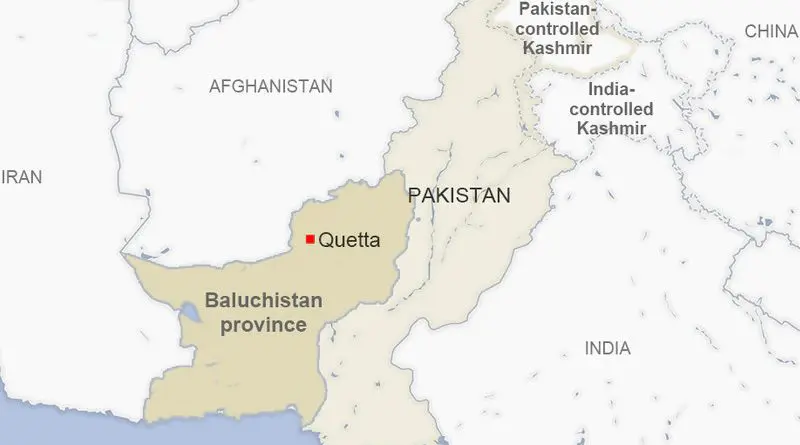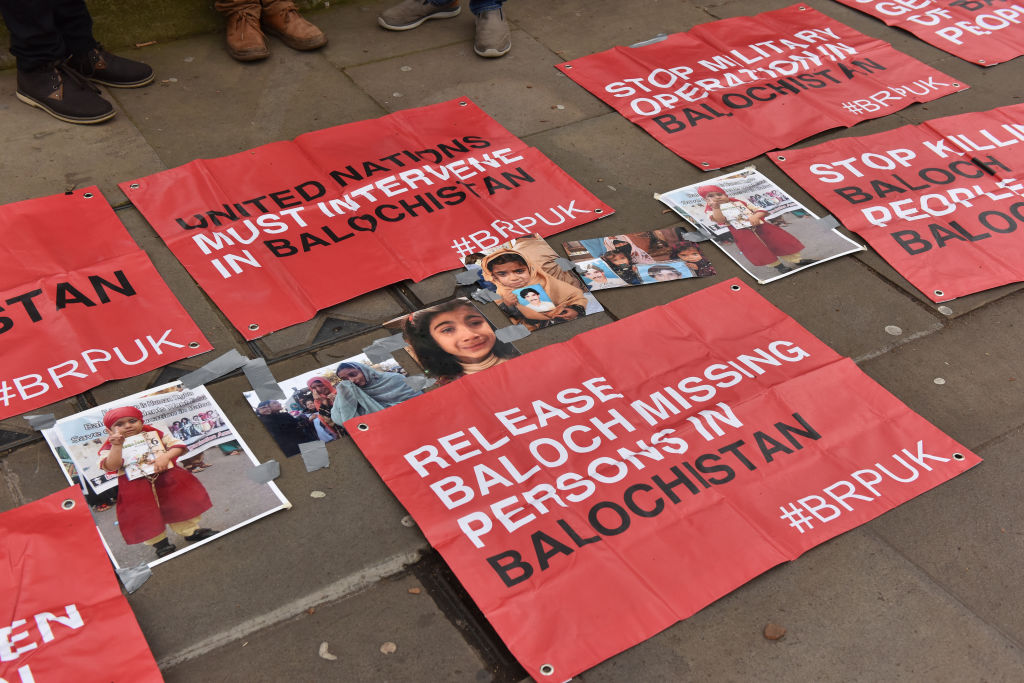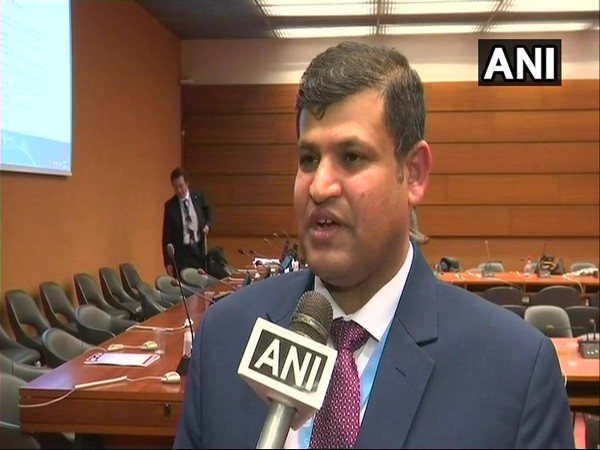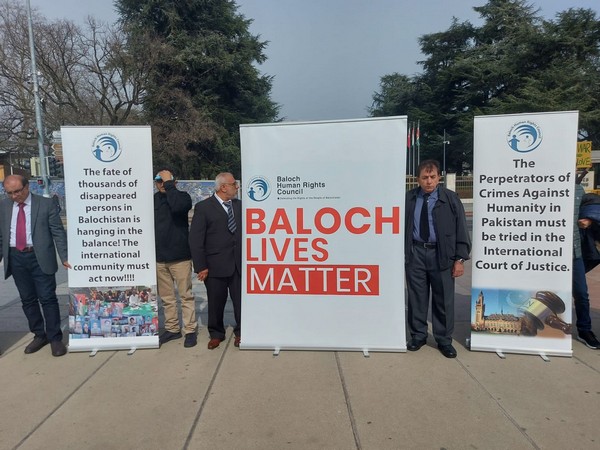By Tushar Ranjan Mohanty
On December 27, 2023, the Islamabad High Court (IHC) told the Islamabad Federal Capital’s Police not to treat Baloch protesters as “enemies”. Justice Miangul Hassan Aurangzeb’s remarks came as he heard a petition filed on December 21, 2023, challenging the arrest of marchers who arrived in the Federal Capital, Islamabad, on foot from Turbat town in the Kech District of Balochistan, and denying them the right to stage a protest in Islamabad against extrajudicial killings as well as enforced disappearances of their loved ones.
Expressing his outrage, Justice Aurangzeb asked the Senior Superintendent of Police (SSP, operations) if the order to treat the protesters ‘harshly’ was given by him and declared, “You make some people sit in your lap while you treat others like this… They have come [here]. Let them sit.”
During the hearing, the counsel for the petitioner – organisers of the protest, Baloch Yakjehti Committee (BYC) – disclosed that 34 Baloch protesters were still in custody. Earlier, on December 25, 2023, Police freed 290 Baloch protesters who had been arrested when they attempted to hold a protest in Islamabad on December 21, 2023.
The Baloch protest march started in Turbat town, Kech District, Balochistan, on December 6, 2023, after the alleged extrajudicial killing of a Baloch youth by Counter Terrorism Department (CTD) personnel on November 23, 2023. On that day, CTD claimed to have killed four suspected terrorists in an intelligence-based operation (IBO) near a bus terminal on Pasni Road in Turbat town. However, the family of one of the deceased – Balaach Mola Bakhsh – and members of civil society staged a sit-in at Shaheed Fida Ahmed Chowk, accompanied by the deceased’s body, and alleged that Balaach was taken away by the CTD from his home in the night of October 29. After 22 days, on November 20, a First Information Report (FIR) was registered against Bakhsh by the CTD, claiming that he had been caught in possession of explosives. He was presented before a court, where another 10 days of police remand were granted. His bail plea was scheduled for November 24, 2023, before which he was killed.
The main demand of the protesters was the arrest of the CTD officials involved in the killing, and the formation of a judicial commission for an independent inquiry into the Department’s action.
As the sit-in protest in Turbat against Balaach’s killing did not yield any result, the protestors decided to relocate their sit-in to Quetta, the provincial capital of Balochistan. They concluded the sit-in in Turbat on December 5, 2023, after which they began their march towards Quetta. As things did not move, the protestors started march towards Islamabad and reached Islamabad on December 20. However, they met with brutal force and more than 200 protesters were taken into custody by the Islamabad Police on December 21.
It is pertinent to recall here that in Balochistan, enforced disappearances and extrajudicial killings by the security forces and their proxies have long been rampant. Victims of enforced disappearances include political workers, journalists, human rights defenders, and students. According to the Voice for Baloch Missing Persons (VBMP), more than 7,000 persons have gone ‘missing’ from Balochistan since 2000. However, the Commission of Inquiry on Enforced Disappearances formed in 2011 with the objective of tracing the missing persons and fixing responsibility on the individuals or organisations responsible for it, posted data on its website claiming that there were just 454 ‘active cases’ of enforced disappearances from Balochistan, as of October 2023.
Further, according to partial data compiled by the South Asia Terrorism Portal (SATP), of the 4,700 conflict-linked civilian fatalities recorded in Balochistan since 2004 (data till December 31, 2023), at least 1,469 are attributable to one or another terrorist/insurgent outfit. Of these, 494 civilian killings (300 in the South and 194 in the North) have been claimed by Baloch separatist formations, while Islamist and sectarian extremist formations – primarily Islamic State, Lashkar-e-Jhangvi (LeJ), Tehreek-e-Taliban Pakistan (TTP) and Ahrar-ul-Hind (Liberators of India) – claimed responsibility for another 975 civilian killings, 892 in the North (mostly in and around Quetta) and 83 in the South. The remaining 3,231 civilian fatalities – 1,848 in the South and 1,383 in the North – remain ‘unattributed’, and are largely believed to have been the handiwork of the Security Forces (SFs) and their death squad proxies.
The state sponsored enforced disappearances and extrajudicial killings have led to a spiral of retaliatory attacks and violence targeting the SFs and state establishments in the province, by Baloch insurgents. Civilians believed to be siding with the state machinery, have also been targeted. In this environment of chaos, Islamist terrorist groups have also thrived and even joined the Baloch groups. The major active Baloch insurgent groups include the Baloch National Army (BNA), Baloch Liberation Army (BLA), Balochistan Liberation Front (BLF), Balochistan Liberation Tigers (BLT) and United Baloch Army (UBA).
According to the SATP database, overall fatalities in Balochistan increased from 406 in 2022 to 466 in 2023, up by 14.77 per cent (data till December 31, 2023). This is the highest number of fatalities in a year since 2016, at 636. Overall fatalities in Balochistan have been on a continuous rise since 2020, after a recent low of 180 in 2019. Balochistan alone accounted for 31.32 per cent of Pakistan’s total of 1,492 terrorism/insurgency-linked fatalities in 2023.
Civilian fatalities in particular have recorded a significant spike in 2023, from 88 in 2022 to 160 in 2023, an increase of 81.81 per cent. The 2023 tally for this category is the highest since 2018, when there were 234 civilian fatalities. After a recent low of 83 in 2019, civilian fatalities have tended to increase, though there was a drop in 2022, with 88 killed, as compared to 111 in 2021.
Non-locals, who are thought to be Army collaborators, face the wrath of Baloch insurgents. These ‘non-locals’ work as spies for SFs, and are also believed to be part of a systematic effort to deny work and benefits to the Baloch population. Baloch insurgent groups such as the BLA, BLF and the Balochistan Republican Army (BRA), among others, began to voice anti-outsider, particularly anti-Punjabi, sentiments in their campaigns in the wake of the military action against the killing of Nawab Akbar Bugti, leader of the Bugti tribe and President of the Jamhoori Watan Party (JWP), in a military operation in the Chalgri area of the Bhamboor Hills of Dera Bugti District, on August 26, 2006. Further, many of the ‘outsiders’ are engaged on the China-Pakistan Economic Corridor (CPEC) projects and are targeted because Baloch insurgents fear that CPEC will convert the Baloch people into minorities in their own homeland. Indeed, CPEC projects principally employ workers brought in from outside the province, overwhelmingly from Punjab.
According to partial data compiled by SATP, a total of 254 ‘non-locals’ have been killed in Balochistan since August 26, 2006, (data till December 31, 2023). Of these, 198 were Punjabis. Other non-locals also fell to the ethnic collateral damage, including 37 Sindhis. The ethnic identity of the remaining 19 was unspecified. Significantly, most of the Punjabi settler killings were recorded in South Balochistan, which accounts for 167 of the total of 198 such killings (principally in Bolan, Kech, Gwadar, Panjgur, Khuzdar, Sibi and Lasbela Districts); and 31 in North Balochistan (mostly in Kalat, Nushki, Quetta and Mustang Districts). The overwhelming concentration of such killings in the South is because of the presence and dominance of Baloch insurgent groups in this region.
Though SF fatalities in 2023 saw an eight per cent decline, down to 186 in 2023, as against 202 in 2022 (the highest in a year since 2000, when SATP started compiling data on conflict in Pakistan), the toll still remains very high. The 2023 number is the second highest recorded in this category during this period. The third highest of 177 was recorded way back in 2012.
Meanwhile, terrorist fatalities continued to rise. From a recent low of 37 in 2020 they jumped to 116 in 2022 and 120 in 2023.
Other parameters of violence also indicate that the overall security situation in Balochistan has deteriorated significantly in 2023. Overall terrorism-related incidents increased from 271 in 2022 to 278 in 2023, the highest in a year since 2015, at 444. Incidents of killing increased from 160 in 2022 to 168 in 2023, the highest since 2015, at 204. The number of suicide attacks and resultant fatalities increased from three and 13, respectively, in 2022, to five and 70, respectively, in 2023. The tally for suicide attacks in 2023 (five) is the highest since 2019, when there were six suicide attacks. However, in terms of resultant fatalities in such attacks, the 2023 tally (70) is the highest since 2018, when there were 209 fatalities.
Islamist groups, mainly the Tehreek-e-Taliban Pakistan (TTP) and its allied groups have also been active in the province. Reports about a TTP-Baloch alliance appeared to receive some confirmation when TTP ‘spokesperson’ Mohammad Khurasani congratulated the Baloch insurgent groups for their twin attacks on Panjgur and Nuskhi Army camps on February 2, 2023, stating,
The Pakistani Army is carrying out the massacre in Balochistan. We are against the massacre of Balochistan as well as in Waziristan by the Pakistani Army. Our enemy is common.
Moreover, the then Federal Interior Minister Sheikh Rashid, citing intelligence reports, told the media on February 3, 2023,
Baloch militants are not capable of launching major attacks in Nuskhi and Panjgur. TTP (Tehreek-e-Taliban Pakistan) has the capability, experience and latest NATO weapons to launch such attacks. There’s some understanding between the TTP and Baloch militants. They have their hideouts in Afghanistan.
The growing nexus between the Baloch insurgents and the TTP is also visible in the absorption of two Baloch groups into the TTP fold. On April 12, 2023, the TTP claimed that a group from Quetta District, led by Asim Baloch, and another from Kalat District, led Akram Baloch, had joined its ranks. Though the development is worrisome for the security agencies and the government, it is not new. Indeed, a local Baloch jihadist group, led by Mazar Baloch from Makran, Balochistan, had joined the TTP on December 23, 2022, as well. Ustad Aslam Baloch’s group from Nushki District was the first Baloch group from Balochistan to join the TTP in June 2022.
The insurgents also target the economic interests of the Pakistani state, as Islamabad is widely and rightly believed to be exploiting Balochistan’s natural resources. Baloch insurgents carried out at least 255 attacks targeting Gas/Oil installations and tankers in Balochistan, which resulted in the loss of 36 lives and 43 injuries. Attacks targeting this source of energy have a significant detrimental impact on Pakistan’s economy, a reality the Baloch insurgents are well aware of, and seek to leverage.
The CPEC projects in the province have been a major bone of contention between Pakistani state and Baloch insurgents. The Baloch resentment towards the CPEC project since its inception in 2013 is that both the civilian population and insurgents believe that CPEC is part of a ‘strategic design’ by China to loot resources. The USD 62 billion CPEC is a massive series of projects that includes a network of highways, railways and energy infrastructure, spanning the entire country. CPEC is a flagship project in China’s ambitious Belt and Road Initiative (BRI).
Baloch groups have carried out attacks directly targeting Chinese nationals engaged in economic activities. According to partial data compiled by SATP, since July 19, 2007, at least 14 attacks directly targeting Chinese nationals have been recorded in Pakistan (12 in Balochistan and two in Sindh), resulting in 79 deaths (data till December 31, 2023). The dead included 10 Chinese nationals, 13 Pakistani SF personnel, 41 Pakistani civilians and 12 attackers. Another, 53 persons, including six Chinese nationals, were injured in these attacks. Most recently, on August 13, 2023, terrorists attacked a convoy of vehicles belonging to SFs and Chinese engineers near the Faqir Colony Bridge in Gwadar city (Gwadar District). The BLA, which took responsibility for the attack, claimed that 11 SF personnel and four Chinese nationals were killed in the attack. Jeeyand Baloch declared that BLA’s Majeed Brigade, its ‘suicide bomber squad’, was behind the attack and stated, further,
We have cautioned China repeatedly to reconsider its activities in Balochistan. BLA views such endeavours as acts of exploitation… Any foreign investments in the region should only proceed after Balochistan achieves independence.
The statement added that BLA had issued a 90-day ultimatum for China to withdraw from Balochistan, or prepare for intensified attacks on its ‘key interests’ in the region.
Though caretaker Prime Minister (PM) Anwaar-ul-Haq Kakar on December 26, 2023, asserted that the welfare and prosperity of the people of Balochistan were amongst his Government’s top priorities, for those who know Islamabad’s longstanding approach towards Baloch people, this is nothing more than a rhetoric. In fact, Islamabad remains hellbent on crushing the legitimate grievances of the Baloch people and exploiting this resource rich province to benefit other parts of the country – particularly Punjab – while the people of this beleaguered province remain deprived of most of the basics, and have the worst developmental profile in the country.
- Tushar Ranjan Mohanty
Research Associate, Institute for Conflict Management
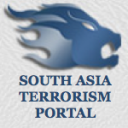
SATP, or the South Asia Terrorism Portal (SATP) publishes the South Asia Intelligence Review, and is a product of The Institute for Conflict Management, a non-Profit Society set up in 1997 in New Delhi, and which is committed to the continuous evaluation and resolution of problems of internal security in South Asia. The Institute was set up on the initiative of, and is presently headed by, its President, Mr. K.P.S. Gill, IPS (Retd).
